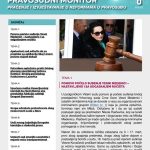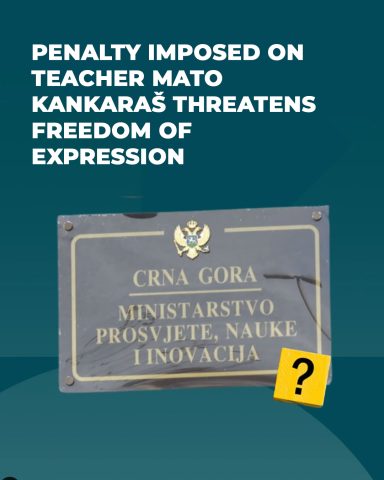N6.BN – BRIEF NEWS
09/04/2025
Number 6: Judicial Monitor – Monitoring and Reporting on Judicial Reforms
11/04/2025PENALTY IMPOSED ON TEACHER MATO KANKARAŠ THREATENS FREEDOM OF EXPRESSION

Human Rights Action (HRA) and Centre for Civic Education (CCE) protest against the decision of the acting principal of the “Slobodan Škerović” Gymnasium, Zoran Pejović, to financially penalise mathematics teacher Mato Kankaraš for expressing his opinion during the TV E programme “At the End of the Day” on 17 January this year. We call on the Ministry of Education, Science and Innovation to reconsider this decision considering international standards on freedom of expression.
During this TV programme, Kankaraš criticised the actions of the principal of the Podgorica Gymnasium, Biljana Vučurović, regarding a case of sexual harassment of a former student by teacher Radoman Čečović, for whom the Educational Inspection proposed dismissal on the very day of this broadcast, pointing out also to the lack of transparency in the school’s public statements on behalf of the teaching staff and in the way the school was represented.
Acting principal Pejović interpreted Kankaraš’s appearance on the TV show as a serious breach of work duties – allegedly humiliating another employee with the aim of damaging their reputation, personal dignity, and integrity – as stated in the decision made on 31 March 2025.
However, there was no such “humiliation” in Kankaraš’s criticism during the programme, let alone any intention to harm Mrs Vučurović’s reputation, dignity, or integrity. Instead, Kankaraš expressed his opinion, as a teacher, on a matter of public interest at a time when the public had access to the scandalous messages that teacher Čečović had sent to a former student, as well as information about the actions, or lack thereof, taken against him.
Three days after Kankaraš’s TV appearance, it was announced that the Ministry of Education, Science and Innovation had dismissed Biljana Vučurović from her position as principal of the Gymnasium, precisely because she failed to take legally prescribed measures regarding the case of sexual harassment. Vučurović did not report the case to the competent authorities, and sanctioned Čečović with a salary reduction of 30%.
It is particularly concerning that the sanctions imposed for sexual harassment (a 30% salary reduction) and for expressing an opinion on a matter of public interest (a 20% salary reduction) are almost identical. Equating a serious professional and human failing with the exercise of freedom of speech is highly problematic in the context of understanding democratic values.
The decision also refers to Pejović’s question to Kankaraš: “Is it appropriate to speak on behalf of the institution without authorisation?” Such a question is unfounded because expressing one’s own opinion and view – including by teachers – is not a matter of authorisation but of a fundamental human right and freedom of expression. Current regulations do not prohibit teachers from expressing their views publicly, and even if such a prohibition existed, it would be unconstitutional.
CCE and HRA assess that the decision to penalise teacher Kankaraš is contrary to Article 10 of the European Convention on Human Rights, which guarantees freedom of expression – that is, the freedom to hold opinions and to receive and impart information and ideas. The case law of the European Court of Human Rights (Sorguç v. Turkey, application no. 17089/03, 23 June 2009) confirms that, on issues of public interest, teachers should be given priority to express their opinions about the institutions or systems in which they work, and to share knowledge and truth without restriction, in comparison to the need to protect an individual’s reputation.
Criticism is a fundamental element of any democratic society because it enables the improvement of practices and positive change. In rule-of-law-based societies, differences in opinions should not be discouraged through penalties but accepted as a constructive process that contributes to greater transparency and accountability in performing public duties.
The final benchmark for Chapter 23, which is key to Montenegro’s accession to the European Union, provides for the effective application and enforcement of the rights and freedoms guaranteed by the European Convention on Human Rights, its protocols, and the case law of the European Court of Human Rights. Therefore, we call on the Ministry of Education, Science and Innovation to review the decision to penalise teacher Kankaraš in accordance with these standards.
Tea Gorjanc Prelević, Executive Director, Human Rights Action (HRA)
Daliborka Uljarević, Executive Director, Centre for Civic Education (CCE)







 English
English